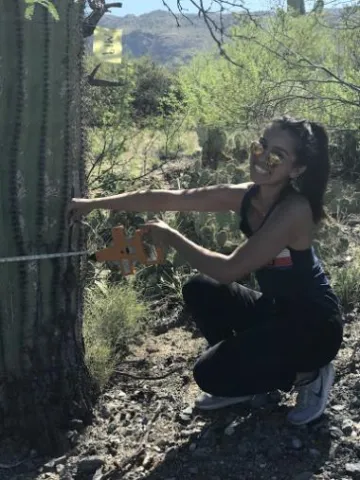
What was the most rewarding part of the internship?
Relationships. She loved the students and the small groups she worked with as they allowed for a very personal experience. The kids were fun to connect with in this, and her partner teacher was very helpful as well.
What was the most challenging part
Managing everything was her biggest challenge. She had previous experience with a full schedule, but still struggled as it was all new to her. She also found much of her effort went into learning how to lesson plan and working through the process of getting it approved.
Since finishing the BDP internship, have you completed any additional internships, volunteer, or job opportunities?
Rachel was part of Latina-based sorority in which she did community service. She enjoyed working with underprivileged people and worked with students of the same background as the students she worked with in the internship, and credits the experience for helping her appreciate their backgrounds more.
Tell us a little about your current position (e.g., what do you do, what do you like about it, how does it/doesn’t it relate to what you studied in college).
Rachel works at the Bursar's Office at the University of Arizona, advising students on their student charges and assist with completing important financial documents for students. She loves being able to interact with students at the university level and financials can be a difficult area to maneuver so she loves being able to advise and assist students on how to pay and how to gain aid. Although she studied Environmental Studies in my Undergraduate career, she found through experiences such as the Bio/Diversity Project that she loved teaching and interacting with students. Throughout undergrad she also worked with the New Start Program which has led her to want to work and pursue a career in Student Affairs.
What skills, knowledge, or connections did you gain by being an intern with The Bio/Diversity Project that helped you get to where you are today?
Rachel learned a variety of skills from the Bio/Diversity Project. These skills include collaboration, public-speaking, organization and time management. The internship facilitates a need to be professional in front of students and your assigned teacher, along with utilizing the skills listed above. During class time, Elena and Jill instruct on how to use these skills in the classroom and how they translate across a variety of careers. Working at the Bursar's Office now, she still utilizes all the skills above. Working in teams was a great experience and is something she is thankful to have done with the internship. Communication above all is key, as education requires it daily and working in groups also requires it. Rachel's knowledge of teaching and creating curriculum also increased immensely and she is forever thankful for that.
While The Bio/Diversity Project is an environmental science outreach program, it also aims to foster diversity and inclusion in the environmental workforce. Since being part of the program, have you had the opportunity to continue working to foster diversity and inclusivity in any way (e.g., through your job, volunteer activities, etc)? If so, please tell us how.
Currently at the Bursar's Office she serves all of the university's population and uphold the values of inclusion that the university has and even supersedes the standards they have. Rachel aims to treat all students equally in advising and assisting them, regardless of their background. As Rachel continues to pursue a Masters in Higher Education, she is sure she will learn more about how to better include and foster diversity within the University of Arizona.
What does it mean to be an alumni of the Bio/Diversity Project? In what ways has this internship shaped you?
The internship allowed Rachel to get to know herself better. She previously wanted to join Teach for America, which focuses on K-12 students, but then realized she wanted to go into higher education instead and make a bigger impact. She grew more comfortable in her skin, and came to understand that education is not perfect, and there is still much to learn.
If you had the opportunity to leave your K-12 students that you taught as an intern in The Bio/Diversity Project a piece of advice, what would you say to them?
Whatever you want to do, whether it be becoming a teacher, going to college, becoming a rapper, an artist, traveling, they can as long as they set their mind to it.
What would you say to someone who is considering participating in the Bio/Diversity Project?
Do it! You will learn so much and it will be an unforgettable experience. Not only is it a fun experience, but you will learn a lot about a variety of topics, about yourself and will make a positive impact on other people's lives.
What’s next for you?
Rachel was recently accepted into a masters program. She wants to work in higher education and the students in that phase of their life.

